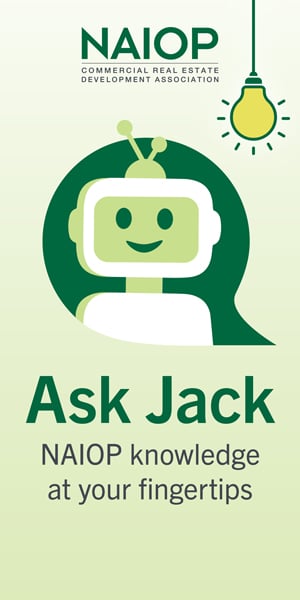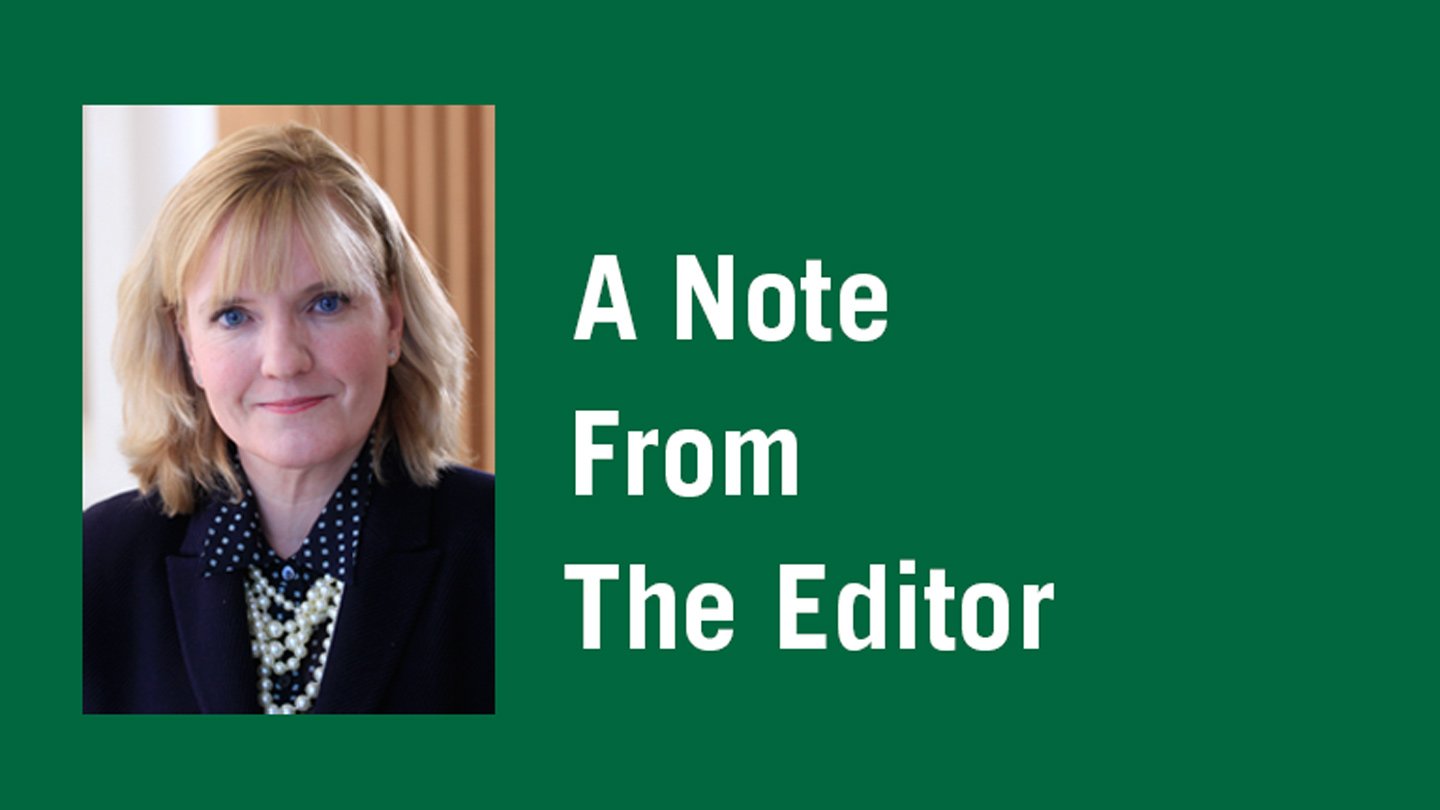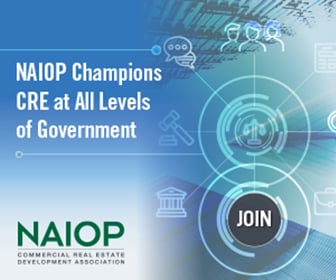NAIOP's National Forums: The Power of Relationships

Five members of the association’s Deal and Investment Concepts Forum tell how members bond through relevant, in-depth conversations in a noncompetitive setting.
NAIOP’s National Forums Symposium brings together prominent industry professionals from across North America to share best practices, strengthen relationships with fellow Forums partners, and identify how to capitalize on business opportunities. In 2011, NAIOP launched its first Forum for Developing Leaders for members who are 35 or younger.
That group has seen many changes in the years since, especially as members aged out of the Developing Leaders (DL) program. But the Forum is growing stronger because of those changes. In fact, the Deal and Investment Concepts Forum, which contains almost 20 members, is among the strongest and most dynamic of NAIOP’s Forums. Development magazine spoke to several members to determine what gives the group its staying power.
Development: Initially, what did you hope to get out of the National Forums Program?
Matt Watson: My involvement with National Forums has been interesting. I was part of the Young Professionals Forum program (the precursor to the Developing Leaders Forum program), and in 2008 during the recession, I was the only member to renew. NAIOP was very helpful and got me involved with another Forum, but that group had been together for years. The group as a whole was very welcoming, yet I felt as if trying to gain long-term relationships in an already established group could be difficult. So, when I was asked if I wanted to join a new group that was being created, I thought it would be a better opportunity to establish long-term, national, professional relationships in our industry.
Robert Stofer: I wanted to expand my network in the commercial real estate industry at a deeper level than what you’re able to do by simply attending panels and networking events.
Rivka Altman: I was a late addition to the Deal and Investment Concepts Forum, as I was nominated by a friend who was an existing member. I was hoping to make professional connections with a diverse group of individuals that spanned the commercial real estate spectrum and country.
Kate Bryden: When I first joined the Forums program, I assumed it would be a more in-depth networking experience, and I did not have expectations for it beyond that. Due in large part to the diversity of experience within my Forum and the candor of our members, it has been substantially more rewarding than a traditional networking experience.
Lex Rickenbaker: A chance to expand my network on a national level and to further my involvement with NAIOP, which had previously only been at the local chapter level.

Development: How has being a Forums member benefited you professionally and personally?
Matt Watson: Strategically, NAIOP was able to put together individuals who were young, but very well-established in their careers. Our group as a whole had very similar personalities and we all bonded immediately. There is no value that can be put on the personal friendships that have come out of being a member of the Deal and Investment Concepts Forum. We are all from different parts of the country and all do different aspects of our industry. Financing, brokerage, development, investment sales and more. We spend a great deal of time when we meet on what we are working on and general market updates. I get more real-time information in our two days together regarding market trends from all across the country than I could in reading 10 newspapers.
Robert Stofer: I have learned a great deal from many talented and intelligent real estate minds within our Forum. Personally, I’ve made new friends that I love to see each meeting, if not more frequently. So it’s a win-win.
Rivka Altman: I have worked on transactions with at least 50 percent of my Forum members whether through an acquisition, disposition, financing or connection to someone in their respective market. The depth of talent, accessibility and desire to help one another has paid dividends. I personally look forward to each Forum meeting that I attend because I thoroughly enjoy spending time with each of the members. We have fun together, whether it is in the meetings, at dinner or during a breakout session. Over the course of the five years I have been a member, our group has gone through a variety of life cycle changes, both good and bad, and our Forum has been there for support, encouragement and inspiration.
Kate Bryden: I’ve developed great friendships among our Forum membership, and those relationships have led to some deep conversations about personal lives, professional goals and other topics. Our Forum often acts as a sounding board for the issues each of us is facing in our careers — providing really valuable feedback about how to approach obstacles and how to plan for advancement. Additionally, the case studies presented by fellow members (usually informal narrative project introductions) have caused me to consider different design and development strategies that I’ve applied to active projects.
Lex Rickenbaker: The intimate and confidential nature of the Forum has provided a relaxed environment for peers to discuss challenges and case studies and learn from them. I have developed relationships with individuals I would likely have never met. In addition, as each member’s career has developed, some personal relationships have provided business opportunities as well.
Development: Is there a particular meeting that stands out? A gathering that drove home the value of Forums for you?
Matt Watson: In 2011, we held our first meeting. Going back to Scottsdale, Arizona, a second time two years ago, and seeing that 99 percent of our group was still together, showed me that everyone gets something out of our meetings.
Robert Stofer: Each meeting has been unique, and we continue to learn how to make our time together most efficient and rewarding.
Kate Bryden: We’ve had a lot of memorable gatherings. We had amazing dinners at the best restaurants in each city with incredibly lively conversations about project and market challenges, as well as daytime meetings discussing specific pro forma details of our members’ projects. Because everything is kept confidential, we’ve established a great level of trust within the group, so a lot of unvarnished information is shared. It’s different from any other NAIOP or professional group experience I’ve ever had. It’s always thought-provoking and rarely superficial.
Lex Rickenbaker: The initial meeting (2011) stands out. Each member was fully willing to participate, and since each member was new, the Forum started with a blank slate to create our own dialogue and direction.
Development: How is the voicing of differing viewpoints encouraged, and how do you select topics to discuss?
Matt Watson: A great deal of our time together is spent on market updates. Everyone has the spotlight for a period of time. Outside of our market updates, we always ask the group prior to meeting what topics we would all like to hear about. Usually one or two people from our group will have some knowledge of a topic and volunteer to present. We have never had a problem finding a volunteer or a topic.
Robert Stofer: At this point, it’s just natural. Our Forum is very respectful of one another, and we always make sure to hear everyone’s “update” on their markets and careers (and personal lives).
Rivka Altman: I don’t think the changing industry has altered the topics that we discuss because of the diverse membership in our Forum. Our Forum solicits ideas two to three months prior to our meetings, and generally we talk about topics that are relevant to current trends. For example, as we began our agenda creation for the Vancouver Spring Forum, we focused our attention around Opportunity Zones and coworking models.
Kate Bryden: There are usually many different viewpoints expressed on almost every topic we cover. It’s a group full of confident and talented individuals — a lot of dominant personalities. And while some are more outspoken than others, there’s a lot of intrinsic respect for each other. We have a roundtable conversation at the start of each meeting that usually lasts several hours where each person provides an update on their activity and market — and that spurs a good amount of discussion and participation itself.
Lex Rickenbaker: Each member has to participate. That can be through presentations, opening and leading dialogue, market tours, case studies and so forth. Each person is working on unique projects and deals. People want to chat about obstacles and challenges and to receive peer feedback.
Development: How has the industry changed during your time in this group?
Robert Stofer: For me, it’s been a bull market since my first day in the Forum. It will be very interesting to see how our conversations shift during the next downturn.
Rivka Altman: Industrial has become the darling of the industry. Retail has become the head-scratcher. Real estate is not your standard four food groups. “Self-Storage,” “Data Center” and “Senior Housing” have each taken a seat at the table. All of the sectors have become intertwined with each other. There is more of a customer-centric focus when developing or repositioning assets, whether it is through hospitality-like amenities in office buildings, coworking space in apartment buildings or last-mile delivery in a retail center.
Kate Bryden: We’ve been on a bit of a roller-coaster ride as an industry since joining this group. When we first got together, almost every market and every product type felt like it was in some level of distress or depression. It’s been interesting to see which product types and markets have come back fastest. Industrial, which has always been my focus and passion, was not the industry darling it is today. It’s been interesting to see that shift, though it hasn’t materially changed the conversations of our group. The market has driven changes and driven our conversations, but I’d say our evolution within our own careers has had a greater impact on the discussion topics. We have spent a fair amount of time acting as a sounding board for each other’s career goals and paths.
Development: How much communication is there among group members outside of meetings?
Matt Watson: There is always some sort of contact throughout the group. We use an app called GroupMe where we all communicate with one another. There are deals being shared, or people trying to connect the dots on a relationship, or just joking around with each other.
Robert Stofer: Any time someone has a question or news to fill the group in on, we reach out to each other. There are also always side conversations going on between different members who are perhaps looking at a deal together or helping each other out with market intel.
Rivka Altman: We’re in constant contact with each other as we view our Forum as a support network and sounding board. If someone hears about something interesting in the market, needs a company contact or help with deal structure, a question is distributed on the listserv.
Kate Bryden: There’s a fair amount of conversation outside of the meetings — some actually real estate-related.
Development: What’s the secret to staying together for so long?
Matt Watson: To be able to get 20-30 random personalities to mesh as well as we do and stay together is no easy task. Our meetings are informational and engaging. There is something for each of us to take away from our meetings that you didn’t know prior.
Robert Stofer: We feel lucky, but we have also had fairly good attendance at the twice-per-year Forum meetings since I’ve joined, so that certainly helps.
Rivka Altman: First and foremost, a successful Forum will have members who commit to it the same way they would commit to a job. Each member has to be willing to show up, be an active participant in the conversation and be willing to help their fellow Forum members. Second, just like a company, the culture of the Forum is important to the retention. If this is established early on, alongside a vision and goals, I think the rest will fall in place.
Kate Bryden: We have a great group chemistry that is due in part to how NAIOP — really Bennett Gray — handpicked each of us. The strong mix of geographic areas, product types and professions within the industry has kept us interesting to each other, I think. The market/product overlap we do have has helped bring a few deals together. We have a great time together but also really lean on each other for advice, connections and perspectives. It would be hard to get as many insightful, informed and simultaneous perspectives on an issue you wanted to bring to the table anywhere else.
Lex Rickenbaker: A relaxed but committed approach. Each meeting is planned and focused on both member updates, presentations and dialogue. But we also want to have fun, and so we organize additional dinners, happy hours and so forth in and around the meeting. These allow us to enjoy some camaraderie outside of the meeting room.
Development: What advice would you have for NAIOP members who are considering joining a Forum?
Matt Watson: First of all, I highly recommend joining a Forum. After that, be prepared to commit. Joining NAIOP or the Forum is the same. You will get out of it what you put in. If you don’t want to travel or can’t commit to the meetings, then it isn’t for you. Life happens, and you will miss a meeting here and there, but the nice thing is that they are scheduled way in advance. You have time to work around your schedule.
Robert Stofer: Go in with an open mind, but do your research ahead of time. Try and meet some of the existing members in the Forum first.
Rivka Altman: Prior to joining a Forum, I would try to understand what your personal goals are for membership and what you hope to get out of it. A Forum is only as good as the participation, attendance and meaningful conversation created at these meetings.
Kate Bryden: If you have the time to commit to it, being in a Forum is really the greatest way to leverage your membership in NAIOP. Most of us already actively network within our markets, but would be reluctant to share professional challenges or case studies with those same peers and competitors knowing that our candor might leave us exposed on a future deal. Real estate is equal parts art and science, and the only way we can learn the art of it — and see opportunities others may not — is to get exposure to more than just our own deals. To use a somewhat overplayed adage, you don’t know what you don’t know. We all need to find ways to learn as much as we can in the shortest time possible so we have time to capitalize on that knowledge and create opportunity. Being on a NAIOP Forum is inimitable professional development and access to a personal board of directors, but a board that can’t fire you!
Rich Tucker is NAIOP’s director for public policy communications.
Want More Information?To learn more about NAIOP’s National Forums program, contact Bennett Gray, vice president for National Forums and Research Foundation, at gray@naiop.org, or Susan Bornt, National Forums and Research Foundation administrator, at bornt@naiop.org. You can also learn more by following this link: www.naiop.org/Connect/National-Forums |







